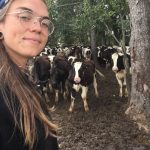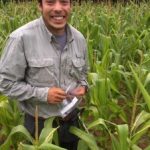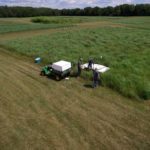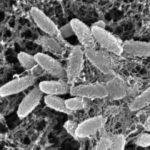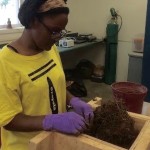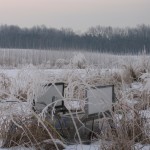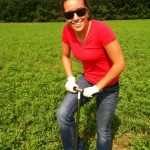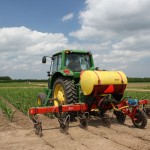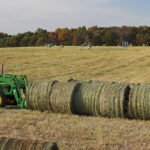MSU graduate researcher, Lindsey Kemmerling, is a PhD student in Dr. Nick Haddad's lab at Michigan State University's Kellogg Biological Station. Society today faces three immense ecological challenges: preventing the loss of biodiversity, adapting to climate change, and sustainably supporting a growing population. Humans have caused a global biodiversity crisis, with new studies continuing to reveal stunning rates of biodiversity decline across the entire tree of life. Simultaneously, we are presented with the challenge of sustainably and equitably supporting a growing human
Poco a poco: The little nopalito in a cornfield
Kellogg Biological Station (KBS) 2018 undergraduate summer researcher, Nicholas Vega Anguiano, is an undergraduate student at Humboldt State University. He wrote about his KBS Research Experiences for Undergraduates (REU) project working with Kate Glanville in the Robertson Lab. Anticipation and nervousness of my impending interview with a W.K. Kellogg Biological Station (KBS) graduate student, Kate Glanville, sent my body into a state of nerves. Throat tight, palms sweaty, and a million doubts running through my mind. Seven minutes until we were scheduled to meet, via a
Almost failing a semester to learn about climate change: Reflections from an undergraduate researcher
KBS undergraduate summer researcher Daimer Castro Vega is a junior at the University of Puerto Rico. He wrote about his Research Experiences for Undergraduates project working with mentor and LTER researcher Kate Glanville, a PhD student in Dr. Phil Robertson's lab at MSU. Daimer was funded by an NSF REU site award to the Kellogg Biological Station. ~~~~~~~~~~~~ If you know something about Puerto Rico, you might have heard that there is a huge debt and that the students went on a strike on April 7, 2017 for more than two months with only three weeks
Are we making selfish microbes?
This piece was authored by Terra Alpaugh and originally posted on the Long Term Ecological Research Network website. ~~~ Some bacteria become less cooperative with their plant hosts under long-term nutrient additions, finds new research by Jen Lau, an ecologist at the Kellogg Biological Station (KBS) LTER, and her collaborator Katy Heath at the University of Illinois. “A decade ago, no one was thinking about the idea of rapid evolution—the kind you could see over a career or even a year or two,” says Lau. Now researchers know that evolution can be measured at much smaller timescales
Gaining a sense of oneness: Reflections from an undergraduate researcher
KBS summer undergraduate researcher Ivori Schley is majoring in laboratory animal science at North Carolina A&T. She wrote about her Research Experience for Undergraduates project working with KBS LTER & GLBRC Postdoctoral Research Associate Sarah Roley in Phil Robertson's lab. Ivori was funded by an NSF REU site award to the Kellogg Biological Station. ~~~~ Hello All! I am Ivori Schley, a rising sophomore from North Carolina Agricultural and Technical State University (North Carolina A&T). During this eventful summer in the Research Experience for Undergrads (REU)
The ‘not so slow’ days of winter at the KBS LTER
By: Sarah L. Hanks, KBS LTER Outreach Team Many folks tend to think that winter is a time of rest and recuperation for farmers and agricultural researchers and professionals. The KBS LTER team would suggest that this could not be further from the truth. Just because there is snow falling and the ground is frozen does not mean that there is time to relax. After talking with Stacey VanderWulp, LTER Project Manager, and Kevin Kahmark, LTER Research Assistant, I found out just how busy things are around the KBS LTER during these cold months. Hundreds of plant samples are collected, by
Soil is life – let’s keep it healthy! Reflections from an undergrad researcher
Each summer the KBS LTER supports students to participate in the Research Experiences for Undergraduates (REU) program, funded by the National Science Foundation. This is part of a larger undergraduate research program at KBS. Alessandra Zuniga, a senior at New Mexico State University, writes about her REU experience working with KBS LTER scientists Christine Sprunger and Brendan O'Neill. Coming from the hot arid deserts of the southwest, I never expected to find myself in the middle of lush green Michigan. I was born and raised in the city of Las Cruces, New Mexico and had the privilege to
Fertilizing to help the planet
This news piece by KBS LTER volunteer and retired journalist Bill Krasean. Researchers at Michigan State University's Kellogg Biological Station (KBS) Long-term Ecological Research (LTER) program have helped develop a way for farmers to reduce crop-related emissions of a greenhouse gas while potentially lowering fertilizer costs, maintaining crop yields, and getting paid to do so. KBS scientists have developed a program to reduce farm-related emissions of nitrous oxide (N2O), a potent greenhouse gas that also destroys ozone in the stratosphere. Using data collected from Michigan farms,
Great Lakes farmers could earn credits for cutting greenhouse gas emissions
KBS LTER research was featured today in the Great Lakes Echo. "Great Lakes farmers who cut their fertilizer use could help reduce greenhouse gases. And if done through a new emissions trading program, they could get other industries to pay them to do it without harming crop yields." Read the full story here >>.
